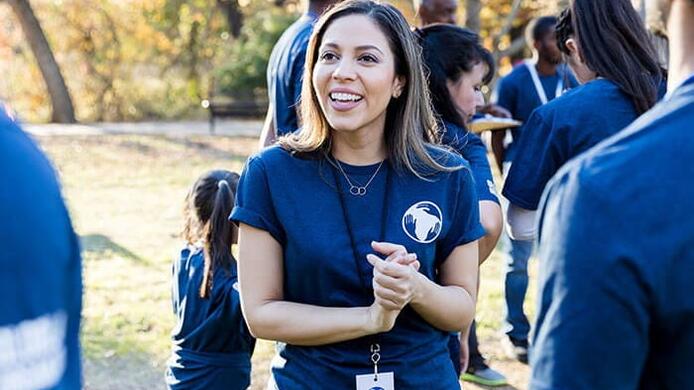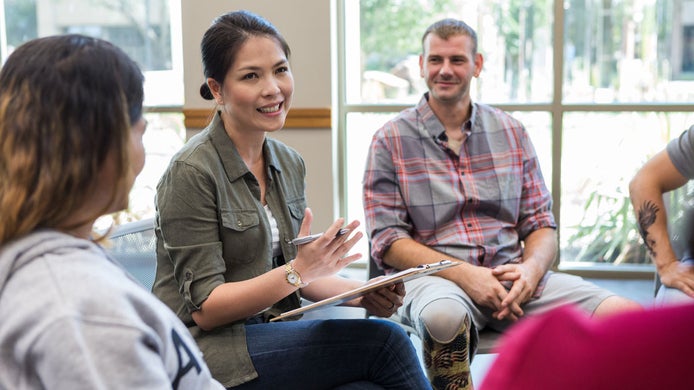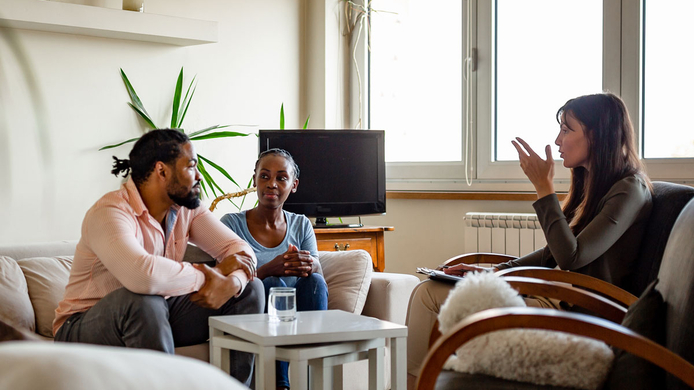Explore our resources for psychology and counseling degrees and learn about career options that fit your future.

At its core, a community is simply a group of people with something in common. But just sharing an interest or living in the same neighborhood doesn’t make a thriving community — people must decide to connect with and care for one another.
The need for strong community ties cannot be understated. Numerous studies have shown that people who experience social isolation and lack of support are at higher risk of stress, anxiety, depression, suicide, mental health decline and chronic disease.
Community psychologists, along with other helping professionals, play important roles in building empowerment. Their unique blend of skills allows them to work closely with the public and focus on creating systems-level changes.
What Is Community Psychology?
Community psychology is a cross-disciplinary field that shares significant overlap with other subjects like public health, social work and sociology. According to the Society for Community Research and Action:
“Community psychology goes beyond an individual focus and integrates social, cultural, economic, political, environmental and international influences to promote positive change, health, and empowerment at individual and systemic levels.”
Professionals in this field are dedicated to improving the overall well-being of a community through collaboration, planning, action and research. Unlike clinical psychologists, who work primarily on a one-to-one basis, community psychologists often work with individuals, groups, stakeholders, policymakers, educators and healthcare providers.
They work in a variety of settings, including:
- Colleges and universities
- Health and human services agencies at the city, county, state and federal levels
- Community groups such as:
- Schools
- Advocacy groups
- Religious institutions
- Neighborhood groups
- Public policy organizations and nonprofits
- Research centers
- Independent or consulting groups
- Private practice
What Defines an Empowered Community?
Communities come in all shapes and sizes. Some of the most common reasons for people to associate and socialize with each other include:
- Interests and activities (sports, hobbies, studies)
- Cultural identity
- Action (intention to bring about change)
- Place (geographic proximity)
- Politics
- Service (volunteering)
Empowerment is the process of increasing people’s abilities to control their own lives. While this practice is often discussed in the context of historically underserved or disenfranchised communities, it can apply to any group with shared interests or goals.
One study suggests that four characteristics of an empowered community setting are:
- A belief system that inspires growth, is strengths-based and is focused beyond the self
- An opportunity role structure that is pervasive, highly accessible and multifunctional
- A support system that is encompassing, peer-based and provides a sense of community
- Leadership that is inspiring, talented, shared and committed to both their setting and members
Now that you understand what an empowered community looks like, let’s explore how community psychologists play a role in the process.
6 Ways Psychologists Can Make a Positive Impact
The community psychologist role goes beyond traditional one-on-one psychotherapy. Their work requires research and a deep understanding of the many factors that influence wellness within a group.
Consider the following ways psychologists work to empower the communities they serve:
1. Organize
Psychologists have many skills that come in handy for organizing and advocacy work, including knowledge of group dynamics, communication and interpersonal relationships. You need these competencies to respectfully engage with diverse communities and create authentic bonds with individuals.
Community psychologists strive to work collaboratively with people and encourage diverse participation from all groups. They may plan or help coordinate programs, classes, events, activities or informal gatherings to bring others together. This process is called coalition building and is fundamental for increasing resilience, especially in historically underserved communities.
2. Advocate
Community psychologists also have a duty to advocate for change on behalf of the people they serve. Their ability to maintain good working relationships with policymakers, elected officials, group members and leaders make them powerful allies for communities fighting oppression.
It’s important to note that any advocacy efforts that a psychologist makes must be informed and guided by those they’re serving. Imposing their own ideals or desires on a group, especially one they are not part of, often does more harm than good.
3. Volunteer
Having a background in psychology is useful in all areas of life, including service to others. You don’t need to be a practicing clinician or psychologist to apply these skills in a volunteer capacity.
People with basic competencies in psychology might be especially helpful in volunteer settings like:
- Mental health advocacy groups
- Suicide prevention organizations
- Programs for at-risk youth
- Food banks and mutual aid sites
Donating your time to help others isn’t just good for the community at large – it's also beneficial to volunteers. Working alongside people in service of a common goal reduces feelings of isolation, which can lead to depression and poor health. A Carnegie Mellon study even found that older adults (above 6o) who volunteered at least 200 hours per year were 40% less likely to develop high blood pressure.
4. Identify and Address Community Problems
Psychologists, therapists and counselors spend a lot of time listening and learning about the lives of their clients — both the challenges and triumphs. That’s why mental health professionals are well-positioned to recognize key social issues within a community.
Some of the most common issues that psychologists help combat at the community level are:
- Homelessness
- Mental health
- Food insecurity
- Suicide
- Domestic violence
- Insufficient access to essential resources
Once key issues have been identified, community psychologists can apply their research, data collection and analysis skills to develop programs aimed at combating the problem.
5. Help Communities Repair and Heal
Conflict resolution is necessary for maintaining both professional and personal relationships. Disagreements, hurt feelings, misunderstandings and perceived or intentional harm are unfortunate but ultimately unavoidable in group settings.
Community psychologists are well-equipped to help guide people through emotionally taxing processes of accountability and restorative justice. These processes take time, effort and intention and can often be uncomfortable, but they are necessary steps on the path to healing.
6. Provide Guidance and Support to Young People
Children and adolescents, no matter how mature they may seem or claim to be, are inherently vulnerable. They have little control over their circumstances or environment and depend on adults in their life to lead them through tough times.
Working with kids isn’t for everyone — it requires a lot of patience, tolerance and flexibility that some people don’t have. Children can have all the feelings and anxieties of adults but are still learning how to identify, manage and express their emotions. Community psychologists have the potential to be excellent role models for young people and should strive to take on guidance, coaching and advisor positions when appropriate.
Make a Difference in Your Community
It’s clear that empowered communities are happier and healthier overall. Everyone has a role to play in building capacity and resilience, including community psychologists.
If you’re curious about what skills or training you’d need to serve your community as a psychologist, visit our blog, "Should I Major in Psychology?".








